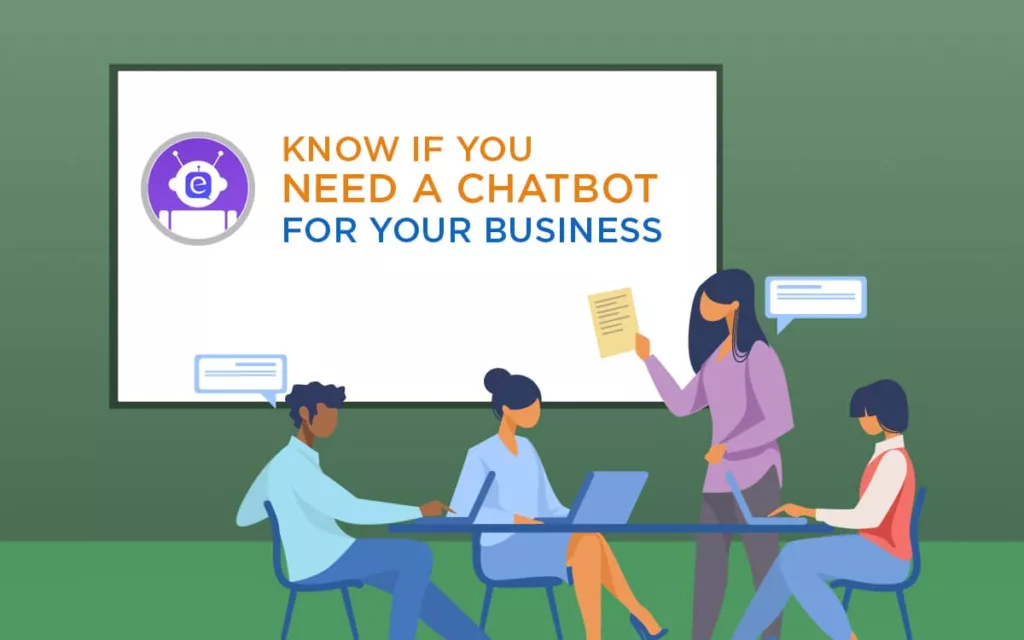The modern marketing lingo is incomplete without the mention of chatbots. Experts have claimed that chatbots will be an integral component of the marketing strategies of businesses all over the world. Around 47% of organizations aim at the implementation of chatbots for customer services, while 40% of them are looking to adopt virtual assistants. In this discussion, we will see if there is a need for chatbot for your business and you are ready for that.
Estimates suggest that the global chatbot market size would exceed $1.3 billion by 2024, and chatbots would serve as a formidable force in business communications. So, it is reasonable for a business owner to look for the best chatbot for your business. On the other hand, you should also step back and consider a few factors before building and deploying a chatbot. You should try to find will your business needs a chatbot or just some improvements in your marketing strategy.
Check if You Need a Chatbot for Your Business
In the present times, businesses seem to run mindlessly after any new technological trend that draws in customers. More often than not, businesses forget to ask, ‘Do I need a chatbot? before going ahead and building one. You can find many chatbots with different functionalities readily available on platforms such as Facebook Messenger.
However, businesses also want intelligent and responsive chatbots that can deliver human-like conversation experiences. Therefore, it is important to give a lot of thought before developing a chatbot for your business. Here are some of the important factors that you should take into account for evaluating whether your business needs chatbots.
1. What do you want to accomplish with chatbots?
The first thing that you must check before choosing a chatbot for your business is the value proposition you want. Finalize the goals you expect to achieve with a chatbot and find the platform that can address your needs specifically. For example, some chatbots are better suited for boosting sales leads, while others are better suited for automating common tasks.
2. What Resources does chatbot use?
The second important thing in choosing chatbots for business is resources. Chatbots generally take a lot of time in development for addressing the needs of a business effectively. So, you would need a lot of skilled talent for developing a chatbot and ensuring that it adapts effectively to customer requirements. If you are ready to invest the resources in developing a chatbot and maintaining it after deployment, then you can look for a chatbot for your business.
3. How Do Chatbots Reduce Business Costs?
Cost reduction is one of the prominent factors in defining how chatbots help businesses. Organizations could automate various common tasks, such as scheduling meetings and answering frequently asked questions, with chatbots. Therefore, it is important to check whether a chatbot can help you reduce business costs before you choose to adopt one.
4. Will Your Customers Accept Chatbots?
The primary objective for which you may consider a chatbot for your business is to reach your customers. However, it is important to verify that your customers are the right demographic for chatbots. For example, customers in the age group of 18 to 34 years are more likely to interact with chatbots. So, even if your business is ready for chatbots, your customers might not! Therefore, you have to review your target audience before you make the final decision to build a chatbot.
5. What Do Your Customers Actually Think About Chatbots?
Chatbots are basically software applications, and although they are tailored for offering the personalization a human can offer, they can get mechanical sometimes. And most importantly, you must remember that every bot has its limits. Chatbots cannot detect when the customer is getting angry. So, you must check the type of questions asked by your customers or users before finalizing your decision.
6. Compliance with Information Security Laws
The next critical factor in the answers to queries such as ‘do I need a chatbot? is compliance. Complex chatbots are also associated with complex infrastructure and complicated data access. However, businesses need to capture personal information about customers to improve the capabilities of their chatbots. In such cases, businesses have to assume the burden of safeguarding data privacy. You must be ready for compliance with the data protection guidelines in your country.
7. Do You Have Patience?
Successful integration and optimization of chatbots within businesses necessitate a patient approach. It’s imperative for decision-makers to recognize that achieving the desired results from chatbots is a gradual process. When selecting a chatbot for your business, exercising patience becomes crucial as the system undergoes continuous learning and refinement, gradually improving its performance and adaptability. Embracing this patience is fundamental to witnessing the full potential of the chatbot unfold and contribute effectively to your business objectives.
8. Is Your Team Ready for Chatbots?
Finally, your team must be on board with the plan of adopting a chatbot. Training and development, alongside adaptability to changes in business processes are some of the major requirements to deploy a chatbot successfully. If your team is ready, then you can go ahead with a chatbot solution for your business.
Is Your Business Ready for a Chatbot?
On a final note, you can notice the various ways in which a business could reflect on whether it needs a chatbot or not. In the most basic sense, adopting a chatbot for your business is a long-term process. The requirement of the initial investment in chatbot development would provide viable returns in the form of cost savings over the long term.
Do you want to learn more about the factors involved in choosing chatbots for business tasks? Reach out to the chatbot experts at eBotify to understand chatbots and their implications for your business before making the decision.








